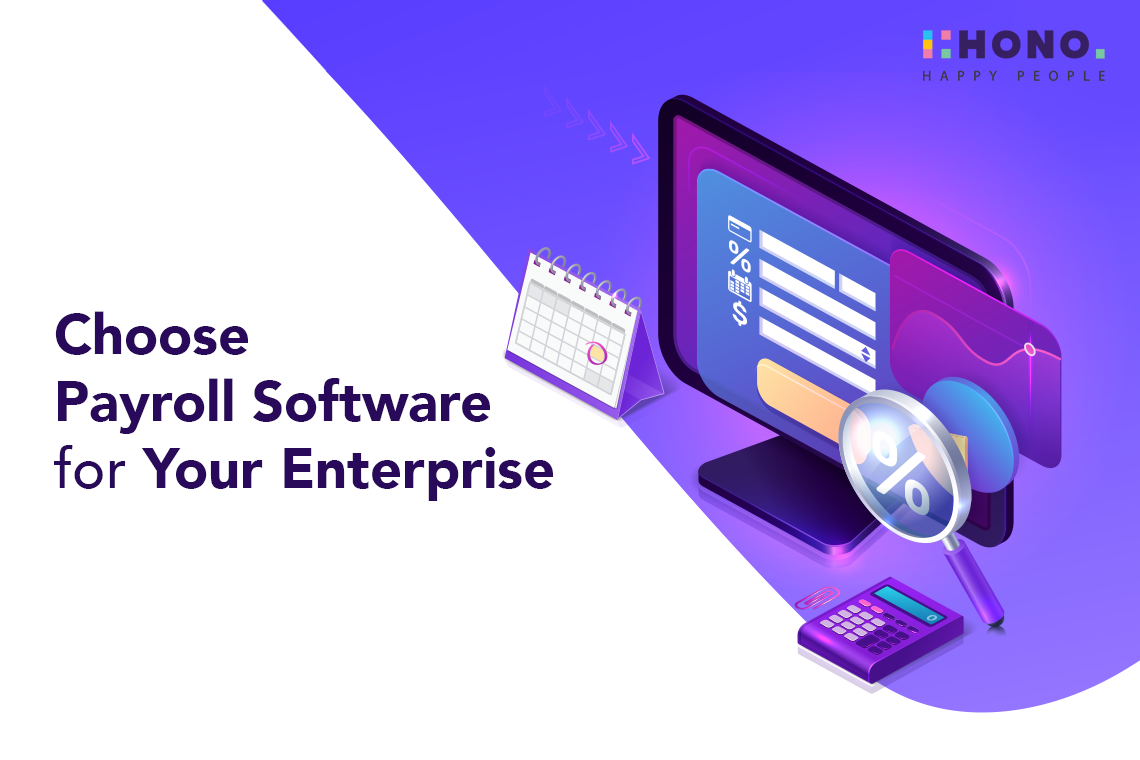- Payroll
Payroll Management in Indonesia - A Comprehensive Guide for HR Professionals
31 Jul, 2024 |

Payroll management in Indonesia presents unique challenges due to its complex regulatory environment, but implementing a streamlined payroll process is essential for businesses of any size. This guide, brought to you by HONO HR, provides insights, best practices, and addresses common pitfalls to empower HR teams.
Indonesia, with its diverse and dynamic economy, requires businesses to stay meticulously informed about labor regulations, especially concerning payroll management. From minimum wage standards to specific taxation obligations and beyond, ensuring compliance is crucial for any business operating within this Southeast Asian nation. This blog delves into the key aspects of payroll management in Indonesia, offering guidance on adhering to the current laws and effectively managing your workforce.
What is Minimum wages in Indonesia?
Minimum wages in Indonesia are not uniform; they vary significantly depending on the province and the specific industry. For instance, as of the latest updates, the minimum wage in Jakarta, the capital city, is considerably higher than in more rural areas like Central Java. Businesses must stay updated with the local government announcements that typically adjust minimum wage rates annually. Ensuring that your payroll system reflects these regional and sectoral differences is not just a matter of compliance, but also of fair employee compensation. 
What are Payroll Taxes and Social Security Contributions?
Both employers and employees in Indonesia are subject to mandatory payroll taxes, which play a pivotal role in the nation's welfare systems. These include:
Income Tax: Withheld at source and varies depending on the employee's income bracket.
Social Security Contributions (BPJS): Indonesia's social security program is divided into two major components:
BPJS Ketenagakerjaan: Covers employment-related accidents, old age benefits, and death.
BPJS Kesehatan: Provides health insurance coverage for employees and their families.
Employers need to accurately calculate these contributions and ensure timely payments to avoid penalties and ensure employee coverage.
What is Form 1721-A?
Form 1721-A is an annual tax form used in Indonesia to report employee income and withholdings related to employment. This form is critical for employers as it details the income tax on employee salaries that has been withheld and remitted throughout the tax year.
Key aspects of Form 1721-A include:
Purpose: To report total earnings, tax withheld, and other relevant fiscal information for each employee over the course of the tax year.
Filing by Employer: It is the responsibility of the employer to prepare and submit this form to the Indonesian tax authorities.
Use for Employees: Employees use this form for their personal tax returns as it contains necessary details to file their individual income tax returns.
Deadline: The deadline for submission typically aligns with the general tax filing deadline in Indonesia, around March 31st each year.
What is SPT-Masa (Monthly Tax Return)?
The SPT-Masa is a monthly tax return used by employers in Indonesia to report and remit withholdings from employee salaries and other types of payments. It is a part of the routine tax compliance activities for businesses and is crucial for the proper administration of payroll taxes.
Key aspects of SPT-Masa include:
Purpose: To report withholding taxes collected on a monthly basis, including taxes withheld from salaries (PPh 21), interest, dividends, and other forms of income.
Filing by Employer: Employers must file this form monthly to account for taxes withheld from employee salaries and other payments.
Electronic Filing: The Indonesian tax authority encourages or mandates the electronic filing of SPT-Masa through their online system, making the process more efficient and secure.
Deadline: The SPT-Masa must be filed by the 20th of the following month to ensure timely submission and payment of the withheld taxes.
Both of these forms are integral to maintaining compliance with Indonesian tax laws for employers. Proper handling, accurate completion, and timely submission of Form 1721-A and SPT-Masa help ensure that both employers and employees meet their tax obligations and avoid any potential penalties or legal issues.

What are Overtime Regulations In Indonesia
In Indonesia, any work done beyond the standard 40-hour workweek is considered overtime and must be compensated accordingly. The regulation is specific:
The first hour of overtime is paid at 1.5 times the regular hourly rate.
Subsequent hours are compensated at twice the normal rate.
Including these calculations in your payroll process is essential for compliance and for maintaining employee relations.
The 13th-Month Salary
One unique aspect of Indonesian payroll regulations is the requirement of a 13th-month salary, often referred to as the "Tunjangan Hari Raya" or religious holiday bonus. This payment, which includes one month's salary plus fixed allowances, is typically paid before the major religious festival of the employee's faith. This bonus needs to be planned for financially and processed correctly within payroll systems.
Leave Entitlements
Employees in Indonesia are entitled to various forms of leave, including:
Annual Leave: Typically 12 days per year after the first year of employment.
Sick Leave: Compensation varies based on the length of the illness, with the employer covering up to 100% of the salary in the initial months.
Maternity/Paternity Leave: Women are entitled to three months of maternity leave, while men receive two days of paternity leave.
Bereavement Leave: Entitlements for bereavement leave vary depending on the relationship to the deceased.
Ensuring your payroll system accurately tracks and manages these entitlements is critical to avoid discrepancies and potential grievances.
Navigating the complexities of payroll management in Indonesia requires a deep understanding of local laws and regulations. Staying compliant not only helps in avoiding legal pitfalls but also supports in building a trustworthy relationship with your employees. Businesses are advised to use robust payroll systems or partner with knowledgeable providers like HONO HR, which can handle these intricacies, allowing you to focus more on your core operations.
For businesses operating in Indonesia, understanding these payroll essentials is key to smooth and compliant operations. Make sure your payroll practices are up-to-date with the latest regulations to maintain your business’s integrity and employee satisfaction. 
Step-by-Step Payroll Process
Here is a detailed step-by-step guide to help businesses streamline their payroll operations effectively.
Step 1: Data Collection
The foundation of an accurate payroll process begins with comprehensive data collection. This includes gathering essential information about each employee, which impacts payroll calculations:
Attendance records to track the actual days worked.
Hours worked, including any overtime hours, to ensure proper compensation according to Indonesian labor laws.
Leave records such as annual, sick, maternity/paternity, and bereavement leave, which might affect salary calculations.
Bonuses or any other additional compensation agreements.
Tax-related data, including existing tax brackets and any personal employee tax considerations.
It’s crucial to have a robust system in place to collect and verify this data regularly to avoid errors in the payroll process.
Step 2: Payroll Calculations
Once all necessary data is collected, the next step involves detailed payroll calculations:
Calculate gross salary based on the collected data about hours worked, overtime, and bonuses.
Deduct social security contributions (BPJS Ketenagakerjaan for employment benefits and BPJS Kesehatan for healthcare) which are mandatory and shared between the employer and the employee.
Compute income tax deductions according to Indonesian tax laws, which vary based on the employee’s income level.
Account for any applicable allowances or deductions, such as leave entitlements or special bonuses.
Using payroll software or consulting with payroll specialists can help ensure these calculations are accurate and comply with all local regulations.
Step 3: Statutory Compliance
Ensuring compliance with Indonesian labor laws is critical. This involves:
Adhering to minimum wage laws which vary by province and sector.
Complying with overtime payment regulations.
Ensuring contributions and deductions for BPJS are accurately calculated and reported.
Observing regulations around leave and other entitlements.
Regular updates from a legal advisor or a dedicated compliance officer can help your business stay informed about any changes in the laws.
Step 4: Reporting and Accounting
The next step is to generate payroll reports for internal and external use:
Internal reports help in analyzing labor costs, budgeting, and financial forecasting.
External reporting involves submitting necessary payroll data to government bodies, such as tax and social security agencies, to comply with reporting obligations.
Integrating payroll data with your accounting systems ensures that all financial records are consistent and that the financial implications of payroll are accurately reflected in your business’s financial statements.
Step 5: Payout and Payslips
The final step in the payroll process is the disbursement of salaries and the issuance of payslips:
Ensure timely salary payments on the agreed-upon dates, which is typically monthly in Indonesia.
Provide detailed payslips to employees, which should include gross salary, net salary, details of all deductions (taxes, social security), bonuses, and any other allowances or deductions.
Payslips can be distributed in electronic or paper format, depending on the preference of the business and its employees.
Implementing an efficient and compliant payroll process in Indonesia requires meticulous attention to detail and a deep understanding of local labor laws. By following these steps, businesses can ensure their payroll operations run smoothly, maintain compliance, and uphold their reputation as reliable employers. For enhanced accuracy and compliance, partnering with experienced payroll solution providers like HONO HR can provide valuable support and peace of mind.
Payroll Challenges and Solutions
Complex Calculations: The varying regional minimum wages and progressive tax brackets can make calculations intricate.
Solution: Leverage HONO's payroll software. With built-in compliance features, it automates calculations, reducing errors and ensuring accuracy.
Manual Processes: Reliance on manual payroll processes increases the risk of errors and delays.
Solution: Implement HONO HR's intuitive platform, designed to streamline data entry, calculations, and reporting.
Changing Regulations: Staying up-to-date with the evolving Indonesian labor laws can be difficult.
Solution: HONO HR's dedicated team monitors regulatory changes and promptly updates our software, providing you with peace of mind. 
Why Choose HONO HR for Payroll Management?
Effortless Compliance: Our automated system ensures adherence to Indonesian labor regulations, minimizing the risk of fines and penalties.
Accurate and Timely Payouts: Eliminate payroll errors and guarantee on-time salary disbursements, fostering employee satisfaction.
Streamlined Processes: Replace manual processes with our intuitive platform, saving you time and resources.
Expert Support: Our team of HR and payroll specialists is always available to provide guidance and resolve any issues.
Data Security: HONO HR employs robust security measures to protect sensitive payroll information.
Upgrade your payroll management with HONO HR. Request a demo today and discover the ease and efficiency our software brings to your HR operations. Choosing HONO HR for your payroll solutions in Indonesia allows you to benefit from expert knowledge of local compliance, streamlined payroll processes, and dedicated support to ensure your payroll operations are efficient and error-free.
HONO HR provides a comprehensive service that covers all aspects of payroll management, ensuring compliance, and employee satisfaction. Effective payroll management in Indonesia requires thorough knowledge of local laws, meticulous planning, and strategic execution. HONO HR offers robust solutions tailored to help your business meet its payroll needs efficiently and compliantly.
For more detailed guidance on implementing a compliant and efficient payroll strategy in Indonesia, visit our website at HONO HR.
Request A Demo Now!
Table of Content
Our Latest Resources
Frequently Asked Questions
In Indonesia, the payroll cycle generally follows a monthly schedule, with payments typically made on the last working day of the month. Additionally, the country has made it mandatory for a 13th salary, known as Tunjangan Hari Raya (THR), which is an annual religious holiday bonus equivalent to one month’s salary. This bonus is paid before major religious holidays, such as Eid-il-Fitri for Muslims and Christmas for Christians and is prorated for employees who have not completed a full year of service. Employers must withhold and remit social security contributions and taxes, including health insurance and pension funds, while maintaining payroll records for at least five years. These practices ensure a structured and fair approach to employee compensation, in compliance with local labor laws.
In Indonesia, the payroll tax system is progressive and varies based on income brackets. Here are the current tax rates:
- Up to Rp50 million: No tax is applied.
- Rp50 million - Rp500 million: A 5% tax rate is applied.
- Rp500 million - Rp5 billion: A 30% tax rate applies.
- Above Rp5 billion: A 35% tax rate is applied.
These rates are based on taxable income brackets, ensuring that higher earners contribute a larger percentage of their income to taxes. This taxation system helps to balance the tax burden across different income levels, providing a fair structure for payroll taxation in the country.
The pay rate in Indonesia varies significantly based on factors such as industry, job role, location, skills, and experience. Here is a breakdown of the current pay rates:
- Average Monthly Salary: The average monthly salary in Indonesia is approximately IDR 12,100,000 (around USD $837).
- Minimum Wage in Jakarta (2024): The minimum wage in Jakarta has increased from IDR 4,901,798 to IDR 5,067,381 per month.
- Average Annual Salary: As of May 2023, the average annual salary in Indonesia is around IDR 146,000,000 (approximately USD $9,872).
These figures provide a general overview of earning potential in Indonesia, but actual pay rates can vary widely depending on specific job roles, industries, and individual qualifications. For instance, salaries in major cities like Jakarta are typically higher compared to other regions, reflecting the cost of living and economic conditions. Additionally, industries such as technology, finance and manufacturing may offer higher salaries compared to other sectors.
Yes, the 13th month salary, known as Tunjangan Hari Raya (THR) payment, is compulsory in Indonesia for full-time employees. This payment is a religious holiday bonus, ensuring employees receive an additional month's salary, and is part of the statutory requirements. THR is culturally significant and is mandatory for all full-time employees as part of Indonesia's labor regulations. This bonus is typically paid before major religious holidays, such as Eid-il-Fitri for Muslims and Christmas for Christians, reflecting its importance in Indonesian culture and labor law.
.png?width=50&height=50&name=Team%20HONO%20logo-01%20(1).png)



